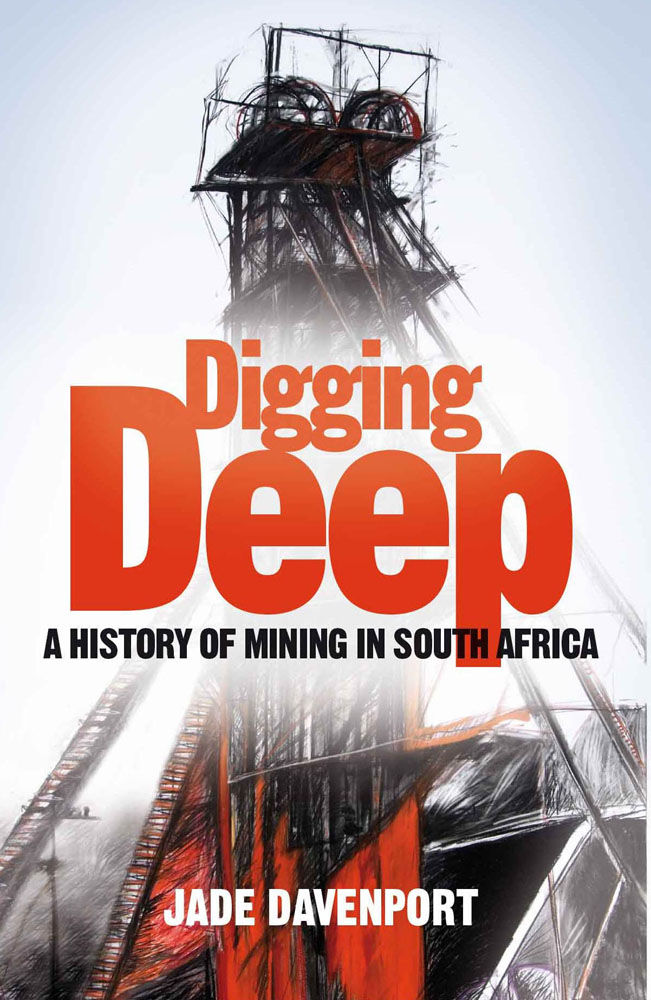Digging Deep is a popular history of the South African mining industry.
Jade Davenport is a young historian whose first book, Digging Deep: A History of Mining in South Africa (Jonathan Ball), comprehensively covers the development and evolution of the industry from earlier times until today.
I can't think of another book, specifically about mining in general, in our history. Is there one that you know of?
Digging Deep is the first book of its kind. It draws on secondary sources, but I've put it all together. It's a popular history, but I've got a master's in history so I've been taught to reference. Hence the 800-odd references at the back of the book!
How did you get into writing about mining?
I've been in the industry since 2005, when I started working for Mining Weekly. In 2007 I decided to marry my love of history with my interest in mining and I did a master's at UCT [University of Cape Town] on colonial mining legislation. My dissertation was an examination of the evolution of mining legislation at the Cape of Good Hope from 1852 to 1910 – we started mining in 1852. I focused on areas such as copper in Namaqualand and the gold rush in Knysna. I love the romance of the diamond rushes and the gold rushes – what people endured to mine. I had also been writing a mining history column in Mining Weekly. Jeremy Boraine, the publishing director of Jonathan Ball, got wind of this and he approached me to do a popular history for them.
Mining is an important part of the South African story, isn't it?
Yes. We mine virtually every commodity in this country, and the mining industry has been enormously influential in shaping the economic, social and political fabric of this country.
Do people understand, do you think, how important this history is?
South Africa's mining heritage is not taken seriously enough. We don't have mining heritage sites, besides Kimberley and Pilgrim's Rest, that are well maintained and well promoted.
And do you think many people understand what aspects of mining go into their daily lives, their cellphones and so on?
No. Look at how cheap cellphones are and yet they wouldn't operate without all those rare-earth metals and so forth. The average Joe doesn't realise what goes on behind their consumer demands.

What about the state of the mining industry in South Africa now? It seems to be in trouble.
Mining is being squeezed by myriad challenges. It's got the labour management crisis to deal with, and for the past 10 years the legislative framework has been riddled with irregularities. I feel that the mining industry is being unnecessarily challenged to provide more and more benefits for all its stakeholders – shareholders want bigger dividends, workers want higher wages, communities want social investment initiatives, the government wants more tax, and at the same time operating costs are increasing. Mines are becoming deeper and harder to operate. So the industry is in dire straits. But it's not the first time, as I point out in the book. The viability of the industry has come into question many times. But it has survived. At the moment I must say the challenges seem overwhelming. The mining industry has always been seen as a golden goose, but now we're strangling it.
What about the hope of beneficiation? Many people talk about this as a solution to South Africa's problems of deindustrialisation and unemployment.
The department of mineral resources constantly talks about beneficiation, but does it do anything? It's all rhetoric. There are initiatives, but they are extremely local and community based. We need it to be driven nationally. We need a strong leadership figure – someone who can be the face of beneficiation, as it were.
You must have visited a fair number of mines. Have you been down any of the really deep ones?
I've been down about a kilometre. That's my limit.